psychonaut

Joined: Dec 08, 2007
Posts: 1305


|

Posted on Sep 03 2012 12:51 PM
LoeD wrote:
Hi all,
just my 2 ct about playing an electric guitar unplugged:
The instrument “electric guitar” consists of the guitar itself, the cord, the amplifier the speaker(s) and eventually some more devices like stomp boxes etc.
The sound of this instrument is influenced by each component starting at the strings and ended at the speaker.
If a guitar sounds good (to oneself!!!!) can only be judged when checking the entire chain and elements of that instrument.
Now you might argue, a guitar sounds different with every amp and what I hear can be a good amp or a good guitar or bad amp or bad guitar.
Your right of course. But it´s still the entire chain you hear and you need to hear that for a complete picture of what an electric guitar sounds like.
You also should judge a guitar in its foreseen context. So don´t try out a Jazzmaster you want to play clean through a dual rectifier at max. gain.
Or some ESP shredder guitar through a Tweed Champ if you want to play metalcore. You know what I mean!
What else:
The acoustic sound of an electric guitar must not be in any relation to its amplified sound.
How is the electric sound created? A string is picked, its movement induces a voltage within the coils of the Pickups. This is amplified and shaped within an amplifier and reproduced very loud (relative to the original sound) through a speaker.
And what do you hear from a unplugged guitar? It is the sound that comes from the strings and resonating elements of the guitar, something a pickup never picks up, as it is only sensitive to magnetic field changes, it has no ears or is kind of a microphone!
The louder a guitar is (acoustically) the less sustain it will have, as the energy for the loudness must be provided from the strings movement.
If this is good or bad has to do with taste and what you need the guitar for.
What I want to say: As the acoustic and electric sounds are created in very different ways you cannot transfer the one and its qualities to the other.
Final important issue:
If you hear it through the amp it´s relevant for the instruments sound. If not it´s not!
For example String buzz at offsets: I have a JM and a JAG both suffer from string buzz at the bridge, audible when played unplugged.
When plugged in this is not audible at all, so I don´t care!
Next example: string squeal when moving chords on round wounds, this is almost inaudible when played unplugged but very present when played amplified, even more when played with overdrive.
Or ringing strings, that are not damped properly will only become a problem when played with heavy overdrive.
You will get serious problems when you don´t learn during practice how to keep the strings quiet you don´t need!
So practice should be done mostly in the same way as you play afterwards.
So for me it is of little value if at all (and no fun) to play unplugged.
This statement. is a bit offensive, but this is on purpose to get the discussion going! Not intended to attack someone or someone´s opinion personally!
So what do you think?
Cheers
LoeD
The point of practicing unplugged isn't about how the guitar sounds, it's about how you sound. It requires more effort to play unplugged, forcing you to really work for it more. an amplified guitar is easier to play, especially when there's sustain and compression involved. In fact a lot of players tend to hold back when they hear that loud sound coming back at them. Playing unplugged isn't as easy and ultimately gives your hands much more control over nuances and dynamics and builds more strength. It doesn't provide a lot of benefit if the amp is doing all the work. Your hands should be challenged to make the sound. At this level of practice, you're concentrating more on the mechanics of playing rather than what it sounds like -- I believe tone and such will develop naturally as a consequence of this. Of course I think you should also practice through an amp part of the time, for many of the reasons you stated. But I've found playing unplugged to be extremely beneficial to my technique.
— https://www.facebook.com/coffindagger
http://coffindaggers.com/
http://thecoffindaggers.bandcamp.com
|
LoeD
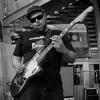
Joined: Feb 29, 2012
Posts: 310
Germany




|

Posted on Sep 03 2012 01:02 PM
hmm, gonna think about it... I was a bit confused by what I read between the lines: "only unplugged practice is good practice" Maybe it´s an even mixture of both?
It will be very tough for me to play unplugged though. I´d eventually find out about my bad technique and poor overall playing... 
— here comes the WEST SAMOA SURFER LEAGUE
|
crumble

Joined: Sep 09, 2008
Posts: 3158
Guildford England





|

Posted on Sep 03 2012 03:06 PM
Something i’ve noticed when playing along to a track unplugged. As i strive to match the recorded guitar (timing, phrasing, velocity and so on) the strings start to oscillate in harmony and my ears are telling me the two sound are nearly alike. But clearly the two sounds are not the same.
Perhaps it is something to do with Timbre - the colour of sound. I found this on Wikipedia but after reading i am non the wiser.
http://en.wikipedia.org/wiki/Timbre
|
SanchoPansen

Joined: Jan 04, 2011
Posts: 1588
Berlin L-Berg







|

Posted on Sep 04 2012 07:05 AM
IMHO LoeD's opinion/argument is spot on. I practice a lot unplugged, also have a small recording 'studio' at home, so I can play amplified (with headphones). All of this is important to learn - true. You get a lot of feeling from playing unplugged. But NOTHING comes close to a cranked up amp in rehearsal. Taming an amplified guitar is what we all should be practicing - every day. Because there's so much more to pay attention to. Your amps settings, stomp boxes, strings, cables, patch cables, picks, and and and... We play ELECTRIC guitar.
— The Hicadoolas
|
psychonaut

Joined: Dec 08, 2007
Posts: 1305


|

Posted on Sep 04 2012 08:18 AM
SanchoPansen wrote:
IMHO LoeD's opinion/argument is spot on. I practice a lot unplugged, also have a small recording 'studio' at home, so I can play amplified (with headphones). All of this is important to learn - true. You get a lot of feeling from playing unplugged. But NOTHING comes close to a cranked up amp in rehearsal. Taming an amplified guitar is what we all should be practicing - every day. Because there's so much more to pay attention to. Your amps settings, stomp boxes, strings, cables, patch cables, picks, and and and... We play ELECTRIC guitar.
I think much differently about this. I think of myself as playing music, not just a particular instrument. I believe playing music should feel as natural and easy as whistling ( which most everyone can do! ) The instrument should be of no consequence. Playing though a cranked up amp is great and a unique experience, but it's not that hard to learn how to control your gear, and really shouldn't be in place of learning music. A very intimate knowledge of the fretboard should really be the goal, so that you can manuver around it as easily as you could whistle.
People fixate on what type of amp and effect, and what type of sound they're making. While all of this factors in and has a level of importance, effects and amps can really mask bad playing. They're really a separate thing to playing music.
— https://www.facebook.com/coffindagger
http://coffindaggers.com/
http://thecoffindaggers.bandcamp.com
|
SanchoPansen

Joined: Jan 04, 2011
Posts: 1588
Berlin L-Berg







|

Posted on Sep 04 2012 08:45 AM
psychonaut wrote:
I think much differently about this. I think of myself as playing music, not just a particular instrument. I believe playing music should feel as natural and easy as whistling ( which most everyone can do! ) The instrument should be of no consequence. Playing though a cranked up amp is great and a unique experience, but it's not that hard to learn how to control your gear, and really shouldn't be in place of learning music. A very intimate knowledge of the fretboard should really be the goal, so that you can manuver around it as easily as you could whistle.
People fixate on what type of amp and effect, and what type of sound they're making. While all of this factors in and has a level of importance, effects and amps can really mask bad playing. They're really a separate thing to playing music.
Well, of course we all play/learn how to play music. But keep in mind that this place is the SURF GUITAR forum  And btw, I can't whistle. And btw, I can't whistle.
You are right and there is no right or wrong on this point, Imho. Learning to play in general is quite essential. Learning to master your equipment is also important.
I guess it is a matter of where you are in the learning process. I play guitar for about 25 years and consider myself as a decent player. Give me a regular song and I'll play it. At this point I find it much more interesting to experiment with equipment and settings as I know my way around the fretboard. But I also pick up a guitar every day at home and play unplugged (because I'm lazy in the first place). It's not bad, but the effect mentioned before about 'the different feeling towards the instrument' is something I can not confirm.
There is a difference between picking up a guitar and not picking up a guitar. No matter if it is unplugged or plugged.
— The Hicadoolas
|
normj
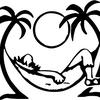
Joined: Apr 26, 2010
Posts: 882
central Indiana






|

Posted on Sep 05 2012 05:58 AM
LoeD wrote: But it´s still the entire chain you hear and you need to hear that for a complete picture of what an electric guitar sounds like.
If I interpret what you are saying correctly, the sound of the guitar does matter. Each guitar does have its own voice. There is a difference in sound from one guitar to the next. That sound difference does come through.
This video has a tone comparision between two Stratocasters. They sound quite different. That difference in tone does come through (the fx and amp). The comparison starts at 7:20 into the video.
http://www.youtube.com/watch?v=PJJJxH8kAS4&feature=related
(Martin, I hope you do not take offense that I used your video. But it does illustrate this point rather well.)
I don't disagree with what you said about looking at the over all package, so to speak. But, nevertheless, the voice of the guitar will come through. Perhaps with enough gain and distortion that is less so. But I play surf and don't use enough gain and distortion to reach the point where the voice of the guitar is indistinguishable.
Talk to you later,
Norm
|
bigtikidude
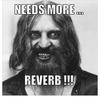
Joined: Feb 27, 2006
Posts: 25685
Anaheim(So.Cal.)U.S.A.






|

Posted on Sep 05 2012 02:23 PM
If a guitar is made of a lesser quality wood, or is poorly designed it will not sustain as long as a guitar that is made better or with better wood.
The best pick-ups or amps won't change those affects in sound.
— Jeff(bigtikidude)
|
SanchoPansen

Joined: Jan 04, 2011
Posts: 1588
Berlin L-Berg







|

Posted on Sep 06 2012 02:30 AM
Which brings up the question: Do we want sustain in surf? My Mosrites all don't have lots of sustain and I love it.
But the point is 'a poor sounding guitar will always sound poor.'
The Aria Diamond DM 380 I bought got an M 3 pup upgrade. It really improved the sound, but the guitar still has it's cheapo/garage sound character.
— The Hicadoolas
|
SlacktoneDave
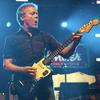
Joined: Jul 01, 2006
Posts: 657


|

Posted on Sep 06 2012 08:25 AM
For a while now, I've made a conscious effort to not play electric guitar unplugged. It's an ELECTRIC guitar. Because acoustically it's so quiet, the tendency is to play to forcefully. When plugged in, either into an amplifier, or in headphones with my recording setup, I can make use of all the subtle dynamic range possibilities that right hand technique can provide.
|
Las_Barracudas
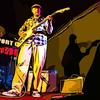
Joined: Apr 24, 2011
Posts: 1087
Surf City, NC





|

Posted on Sep 06 2012 08:36 AM
Ditto as to what SlacktoneDave said.
Playing too much unplugged (for me) equals playing too hard on stage.
That said I don't use a lot of volume when practicing at home.
— METEOR IV on reverbnation
Last edited: Sep 06, 2012 12:16:02
|
El_Sonido
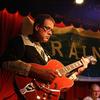
Joined: Aug 17, 2012
Posts: 85
Tucson, AZ

|

Posted on Sep 06 2012 10:51 AM
normj wrote:
+1 I always play an electric guitar unplugged first when checking when checking it out. If it doesn't have 'something' I don't even bother plugging it in. I figure pickups can be swapped pretty easily, but the woods gotta sound right.
I have played much unplugged, living in apartments and whatnot. However, I find using an amp at low volume is preferable because it amplifies mistakes (like an occasional open string ringing for example) that are hard to hear if you're unplugged. As someone else mentioned, I'll also feel uncontrolled and awkward if I've been playing a lot unplugged and then have to play though an amp, especially at band volumes.
Probably some of both is good practice.
guitar wrote: Spend time playing your (electric) guitar unplugged.
Martin,
That is also how I select guitars. I like to hear the voice of the actual guitar. Seems like each guitar has its own voice. You can play a couple Stratocasters, for instance, and they will sound different (unplugged).
Talk to you later,
Norm
|














 And btw, I can't whistle.
And btw, I can't whistle.























